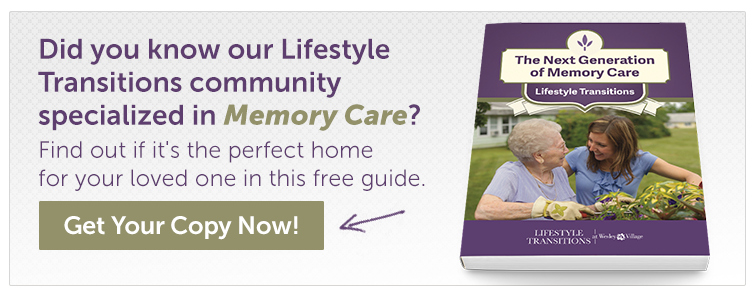FAQs: Everything You Need to Know about Memory Care in CT
Are you searching for memory care in Connecticut for a senior parent or loved one? Memory care is a highly specialized type of care that, while being perfect for some, isn’t for everyone. There’s a difference between a senior having forgetful moments and needing to be in a memory care facility. To learn a little bit more about what memory care is and what your options for memory care in CT are, let’s look at some of the questions we’re frequently asked.
What Is Memory Care?
First and foremost, families want to know what exactly memory care is. If this is your first time looking for a senior living community for a loved one, specialized memory care is a type of care you might not be familiar with. This is care designed specifically for seniors with Alzheimer’s disease or dementia, to meet and support needs specific to those with memory impairment.
How Is Memory Care Different from Assisted Living?
Memory care, while being a type of assisted living care, is not the same as the communities you would probably picture. Seniors with Alzheimer’s disease or dementia have unique needs that differ from those of seniors in traditional assisted living communities. Individuals with memory disorders require a higher level of clinical care and assistance than other seniors need. Seniors with memory impairment also need greater assistance with daily tasks and staying engaged both physically and mentally.
To best care for seniors with memory-related disorders, memory care wings of assisted living communities are usually separate from the rest of the community. This keeps residents in areas they’re familiar with and allows the community staff to easily monitor residents if needed.
One of the greatest benefits for seniors in memory care communities is that they live in a structured environment, with meals served on a schedule and staff members available to help them through the day. For seniors with memory impairment, time and schedules can be confusing. With structured meals and activities, residents can become more comfortable in their day to day living.
How Much Does Memory Care Cost, and Are There Payment Options?
While there’s no single answer when it comes to the cost of memory care, there are a variety of options for every budget. Ultimately, the cost of care usually correlates with the level of care your parent or senior loved one receives. A higher level of care comes at a higher price. Depending on the level of care your loved one needs, memory care in CT can cost anywhere from $7,000 to $12,000 a month.
While this number may shock you, don’t worry. There are plenty of ways to subsidize this cost, like with long-term care insurance, reverse mortgages, selling a home, veteran’s benefits, and more. The best way to find out if you can afford a memory care community is to talk to community administrators in your area and learn more about pricing and payment options. They can also give you some advice on funding alternatives you could possibly use. Note that Medicaid does not cover the costs of assisted living.
How Do I Know if My Loved One Should be in a Memory Care Community?
While you may notice a few moments here and there when your loved one seems disoriented or confused, that doesn’t always mean that memory care is the best place for them. To determine if your loved one needs to be in a memory care community, ask yourself the following questions. If you answer “no” to most or all of these questions, it’s likely time to start exploring your memory care options.
- Can your loved one develop and maintain his or her own schedule?
- Can they meet their own nutritional needs? Do they eat at least three meals a day? Do they still cook unsupervised?
- Is the home they live in safe for someone with memory challenges? Does their home have door and window locks, motion detectors, alarm systems, adequate lighting, no-slip flooring, or other safety features?
- Are they lucid (i.e., not forgetful or struggling with memory)?
- Can your loved one perform regular household tasks on their own?
- Are they a safe driver?
- Does your loved one have a Wander-Protection System? (This is a common feature in memory care communities.)
- Does your loved one easily manage their own medication?
What Should the Aide-to-Resident Ratio be in a Memory Care Community?
You want your senior loved one to receive the best, more attentive care possible. But an overcrowded community might fail to meet those expectations. Before moving your loved one into a community, only to realize they need a higher level of care, you need to invest some time and effort into researching the aide-to-resident ratio of every community you're considering
A good rule of thumb is to have one aide for every eight residents during the day. Because residents are less active at night, there are usually 15 residents for every one aide. Many memory care communities also offer regular check-ins on the residents, like every two hours for example, to ensure they’re still safe and secure.
The ratio will be different at every memory care community, so be sure to ask about it during your visit.
What Types of Activities Are Available for Residents?
Your senior loved deserves to have a fulfilling life even after receiving an Alzheimer’s or dementia diagnosis. Luckily, top memory care communities invest a lot of effort into making sure residents are engaged, active, and enjoying life.
You can find communities that offer a wide variety of social activities like gardening clubs, cooking lessons, and more. There are also a number of physical activities they can engage in too, like yoga, swimming, and aerobics. These types of activities are usually available for all residents in assisted living communities, including those in the memory care wing.
Memory care also includes specialized programs to help those with memory impairment. Programs like music therapy are designed specifically to help seniors with memory loss. Studies suggest that music is a helpful way for seniors to exercise their brains and strengthen their memory and communication skills.
Should My Loved One be in a Secured or “Lockdown” Unit?
A major concern for family members with a loved one with dementia is that they will wander off due to confusion or forgetfulness. This is why memory care communities are typically in a secured unit with locked door and windows, and staff members stationed at the main entrance and exit. These measures keep seniors safe and in the controlled environment of the memory care community.
Another safety measure memory care units offer is bracelets to prevent seniors from wandering off. These bracelets give residents freedom, while still monitoring their location so they don’t leave the secured area. You can rest easy knowing that your loved one is always safe and monitored in a memory care community.
Memory care communities are great options for seniors with Alzheimer’s disease or dementia. As you evaluate your options for senior care, be sure to visit memory care communities in your area. These are safe, comfortable environments where seniors with memory challenges can flourish.
Learn more about options for memory care in CT. Download this brochure now.
About Chelsea Sayegh
I started working as a Marketing Coordinator for United Methodist Homes in October of 2016. I work on public relations, website management and community planning for their award winning independent and assisted living communities. As a graduate of Ursinus College with a degree in Media and Communications and a passion for serving nonprofits, United Methodist Homes has become my home away from home. I spend my days working in a community filled with smiling faces, helpful hands and wonderful residents. I have a passion for assisting seniors and take great pride in being able to promote a company with such a positive mission and values. As an individual committed to learning and growing, I have jumped right into this exciting career!

Our Blog is a 2016 Platinum Generations Award Winner! The Generations Award is an annual international competition for excellence in senior marketing recognizing professionals who have communicated to the 50+ Mature Markets.




